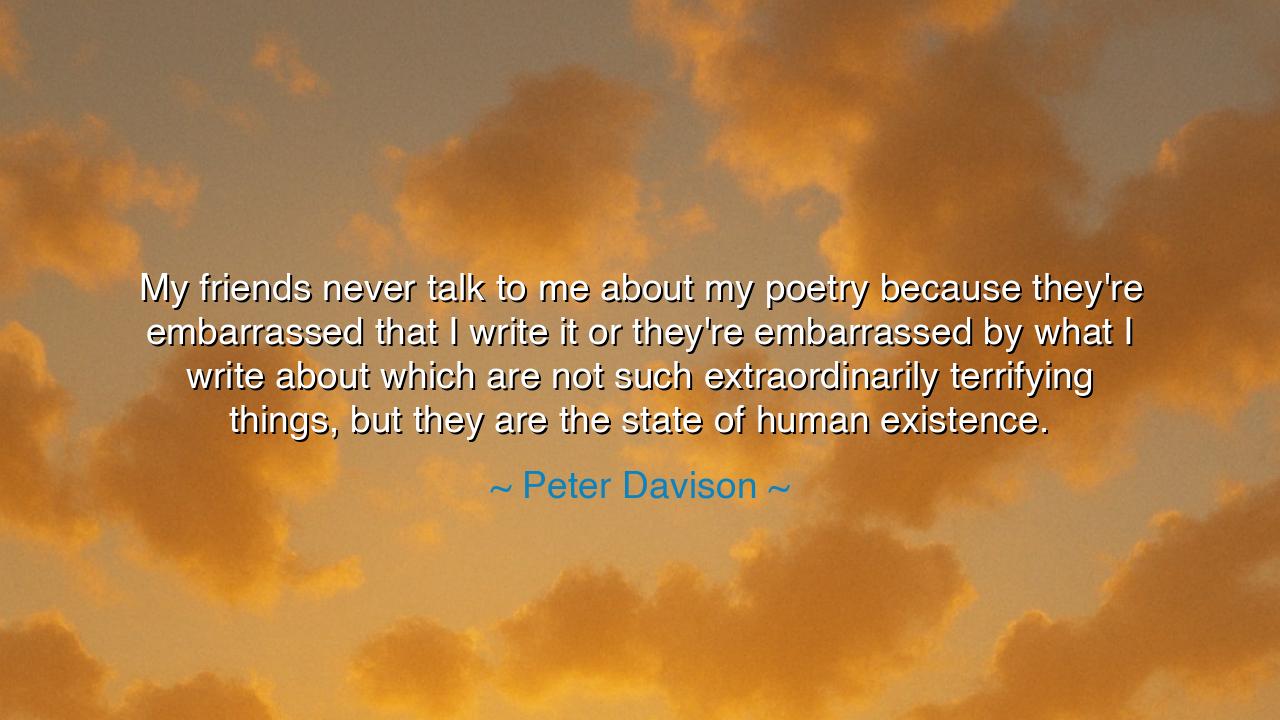
My friends never talk to me about my poetry because they're
My friends never talk to me about my poetry because they're embarrassed that I write it or they're embarrassed by what I write about which are not such extraordinarily terrifying things, but they are the state of human existence.






Hear the confession of Peter Davison, a poet both humble and honest, who declared: “My friends never talk to me about my poetry because they’re embarrassed that I write it or they’re embarrassed by what I write about which are not such extraordinarily terrifying things, but they are the state of human existence.” In these words lies a revelation, not only of his own experience, but of the burden all poets carry. For the poet dares to speak aloud what others only whisper in their hearts, and for this, even friends may avert their eyes, uneasy before such naked truth.
The meaning of his words strikes deep: people are not embarrassed because the poet invents horrors, but because he speaks of the ordinary truths of existence—loneliness, longing, mortality, hope, despair. These are not terrifying in themselves, yet they disturb because they are too close, too honest, too much like the quiet fears and hidden thoughts each person carries but seldom names. Thus, when the poet gives voice to them, others feel exposed, as if the veil of silence that protects daily life has been torn away.
The ancients knew this burden of the poet. In Athens, when Euripides staged his tragedies, some accused him of corrupting the people by placing on stage the raw struggles of men and women—jealousy, betrayal, grief, the cruelty of fate. And yet, those very plays endure because they told truths others could not face. In Rome, Juvenal’s satires embarrassed the powerful because they laid bare corruption and folly. So too with Davison: his friends were not rejecting him, but recoiling from the mirror he held before them, the mirror of human existence itself.
History offers us many parallels. Consider Sylvia Plath, whose poems were not filled with demons of myth but with the anguish of domestic life, the weight of depression, the yearning of a restless spirit. Many in her time were embarrassed by her candor, preferring to silence or dismiss her. Yet today, her words are read as revelations of a human struggle that is universal. Or think of Anna Akhmatova in Russia, whose verses spoke of the pain of waiting outside prisons for loved ones—simple, ordinary scenes, yet so full of truth that her people whispered them in secret, embarrassed not by vulgarity but by the unbearable reality she unveiled.
Davison’s words also teach us something about the loneliness of poets. They are often surrounded by people who admire their craft but are uneasy with their honesty. To be a poet is to walk a narrow road between communion and solitude: one speaks for humanity, but humanity often shrinks from hearing. The poet is not an entertainer but a truth-teller, and truth unsettles even friends. Yet it is this very unsettling power that makes poetry necessary.
The lesson for us is clear: do not turn away in embarrassment when confronted with the truths of human existence. Welcome the poet’s honesty, for it is a gift, a courage that speaks what many cannot. If you are a poet, accept that some will be uncomfortable with your words, but do not let that silence you. For your task is not to flatter but to reveal, not to comfort only but to awaken.
Practical wisdom flows from this. Read poetry not to escape, but to see yourself more clearly. Share your own words, even if they feel vulnerable, for others may need them more than you know. When your friends or loved ones speak their truth, resist embarrassment






TMNguyen Thao My
This statement raises questions about vulnerability and reception in art. Why might ordinary reflections on life evoke embarrassment, and what does that say about human discomfort with self-reflection? I also think about the role of poetry as a mirror to existence—if friends cannot face the reflection, does that limit the poet’s ability to connect personally as well as publicly? How might one balance honesty in writing with the sensitivities of close relationships?
CSChaeyoung Son
I feel a sense of frustration mixed with empathy reading this. It seems that even when poetry addresses universal experiences, it can alienate those closest to the poet. Does Davison perceive this as a failure of communication or a natural boundary between creator and audience? I also wonder if such reactions influence the poet’s writing—do they encourage deeper exploration, or do they provoke caution in sharing certain themes?
TCTue Chi
This quote makes me curious about the relationship between content and audience comfort. Are people embarrassed because the subject matter is too real, or because they fear judgment for not understanding? I also wonder if Davison’s friends avoid discussion to protect themselves or to avoid confronting uncomfortable truths. How do poets navigate sharing work that resonates deeply with human experience while maintaining personal relationships that might not be as comfortable with such honesty?
NTThao Nguyen Thi
Reading this, I’m struck by the tension between artistic expression and social intimacy. Does Davison feel a sense of alienation from friends because they cannot engage with his poetry? I also question whether this reflects a broader issue about the way society handles vulnerability and existential reflection. Could it be that art, by confronting the state of human existence, highlights what casual conversations often avoid, creating both admiration and discomfort?
TCTrong Clever
I find this statement both poignant and thought-provoking. Why do friends sometimes feel embarrassed by honesty in art, even when it is not extreme or shocking? Could it be that poetry forces people to confront their own vulnerabilities, making them uncomfortable? I also wonder if Davison experiences this as a limitation on meaningful dialogue or if it inspires him to seek audiences who can engage without embarrassment.